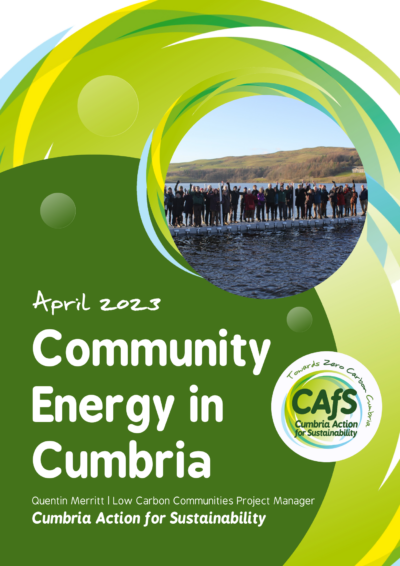Support for Community Renewable Energy Projects
We can support community groups with the development of community renewable energy projects, as part of Zero Carbon Cumbria, funded by the National Lottery. This support can help to initiate a totally new idea, or progress an existing project.
What is Community Renewable Energy?
When we talk about a ‘community renewable energy project’, we mean a project that is led or co-led by a community organisation of some kind, or owned wholly or in part by members of the community, or benefits a community by:
Supplying clean electricity to community members, or
Supporting a community benefit fund to fund local community projects, or
Supplying clean energy to, or sharing clean energy between, a community facility(ies)
Community Renewable Energy in Cumbria
 Take a look at our Community Energy in Cumbria research report. This research has informed a programme of support that we can now offer.
Take a look at our Community Energy in Cumbria research report. This research has informed a programme of support that we can now offer.
The report covers renewable energy sources, and community energy models for power and heat, both direct consumption models and export models. It considers key issues and barriers, including the distance between installation point and consumer, funding, permissions, team capacity, site selection, and system size and grid connection.
Mini case studies highlight different community energy projects and illustrate the potential for more community energy across the county. These include Burneside Community Energy, which installed a 250kW solar PV system on factory roofs ; Community Energy Cumbria, which developed a 30kW hydro scheme at Killington reservoir and 30kW solar PV system on the roof of the HQ of the Lake District National Park, and Skelton Memorial Hall which installed a 60 panel, 19.5kW solar PV array on the hall roof, with battery storage capacity of approximately 35.8kWh.
Support Summary
Light-touch advice | Jul 2023 – Sep 2025
Specialist consultancy | Jul 2023 – Aug 2024
Grant funding | Sept 2024 – Nov 2024
Eligibility
To be eligible for support, you need to be either a community group, including informal, unconstituted groups; or a town or parish council, a school, or a local business or other local organisation working in partnership with a community group that is developing a renewable energy project for the benefit of your local community. If you are unsure if you are eligible, please contact us and we will advise.
Support Available
Light-touch Support
Monday 26th June 2023 – Friday 29th September 2025
For any group looking to develop a community renewable energy project
CAfS can provide a free 30-minute advice call from a renewable energy specialist by telephone, Zoom or email. We will endeavour to answer your questions, highlight things to consider, outline the options available to you and signpost you to support (including the support outlined below), potential delivery routes and examples from elsewhere.
Email us or telephone our office at 01768 210276.
Specialist consultancy support for initial project development
This opportunity has now closed.
Between June 2023 and Aug 2024 we supported six different community energy projects. These were:
- A building energy and renewables assessment for a building in Ulverston that had been identified as having potential to become a community hub;
- A solar photovoltaic assessment of three residential sites (in Windermere, Ambleside and Keswick), which looked in particular at suitability for technology that would share electricity generated from a rooftop solar array between multiple apartments;
- A community-owned energy proposal, looking at installing solar PV on a large factory unit, a rugby club and a couple of local schools in Wigton.
- A proposal for heating and renewable energy installations in a Church in Greystoke, that would pave to way towards a micro-district heating system powered by a heat pump and ground source array which would provide heat to the Church and other community facilities.
If you are considering similar projects and would like to learn more about these studies, please get in touch via [email protected].
Grant funding for further project development
We are currently open to grant funding applications of up to £15,000 for community energy projects. Applications close Sunday 24 November at midnight. Please click here for details.
Cumbrian Community Renewable Energy Projects
Check out just some of the community energy projects across Cumbria.
Alston Moor Community Energy: AMCE ran a successful crowdfunding campaign to raise £22,300 to install a 27kW solar PV system on the roof of Samuel King’s School in Alston.
Baywind Energy Co-op: Baywind raised £2 million through share offers in 1997 to install six wind turbines (totalling 2.5MW) in southwest Cumbria. In 2016, 5 of the turbines were decommissioned and replaced by two new high-powered turbines. More recently, Baywind has installed roof-top solar on eight buildings in the Furness area.
Burneside Community Energy: BCE operates a 1MW solar PV scheme on roofs at James Cropper plc in Burneside.
Community Energy Cumbria: CEC operates two community energy schemes: a 30kW hydro scheme at Killington reservoir and a 30kW solar PV scheme on the roof of the Lake District National Park Authority’s offices in Kendal.
Energy4All: E4A is a community energy company based in Barrow. It was set up in 2002 and now supports a family of 33 independent renewable energy co-operatives spread throughout England and Scotland, with over 17,000 individual members. projects.
High Winds Community Energy Society: High Winds owns and operates the two new turbines (totalling 4.6MW) that replaced the 5 original Baywind turbines at Harlock Hill near Ulverston. In 2017, High Winds became the first community energy company to take over a 100% commercial wind farm when it acquired the 6.9MW Mean Moor windfarm.
M&S Energy Society: M&S Energy Society aka Two Rivers Community Energy Society are based in Barrow and administered by E4A. The public can apply to invest in a fund from which M&S will install and maintain solar panels on up to nine M&S store roofs. M&S will buy the electricity generated by the panels from M&S Energy Society.
Rainepower Community Energy Society: RainePower owns and operates a 35kW hydro scheme on the river Lune near Sedbergh. RainePower is a member of the E4A family of co-operatives.
More info…
You’ll get more info from the following organisations:
Funder
This support is offered thanks to the National Lottery Community Fund.


